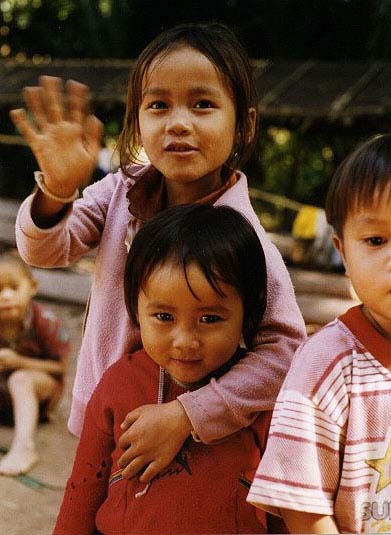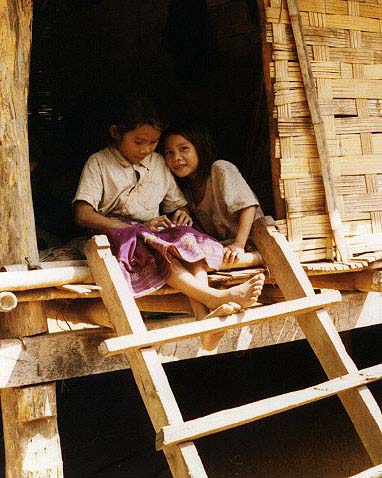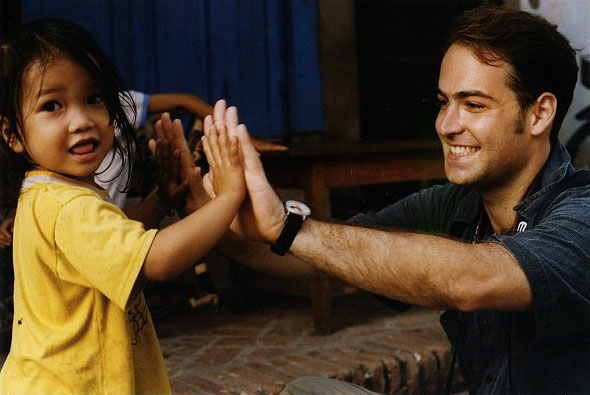
The Pak Ou Caves
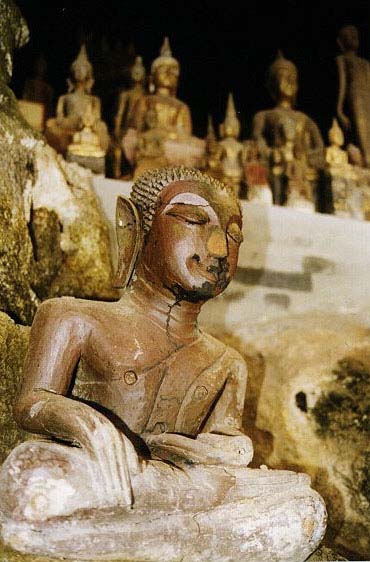 |
| Buddha statue, Pak Ou Caves |
Andy and I woke up early this morning and headed down to our favorite bakery. We picked up a bag of bread, then walked down to the steps of Wat Xieng Thong where we had arranged to meet a boatman. Through the palm trees and down the riverbank, we could see the muddy Mekong trip over branches and stones. A Lao boy sat on a stone lion at the top of the steps and surveyed the river. For the next ten minutes we shared a roll of coconut bread and watched the water. At 9AM the boatman showed up and led us down to the riverbank. He was a thin man with deep wrinkles and dark hair. On the water below, his wife maneuvered their long wooden boat into a crowd of other longboats. The boatman laid a wooden plank from the deck of his boat to the sandy bank at our feet. We walked across the plank and onto the long, thin, green-colored boat. The roof of the boat was fashioned out of low wooden beams, and we had to bend over to get to the seats. The chairs were like the kind you would find in a little girl's tea set - small, wooden and damned uncomfortable. The boatman's sturdy-looking wife sank her oar into the mud and pushed us off the riverbank while he sat up front and steered. The rattle of the motor drowned out the sounds of life along the Mekong, but we had a beautiful view.
We traveled about 25 kilometers up the river as it snaked through vine covered hills. Women washed clothes along the banks. Naked boys swam and splashed. The dense jungle crept all the way down to the riverbank. Vines draped from tree to tree, creating canopies above canopies. I searched for a glimpse of some animal or bird but the trees were so thick, all I could see was green. We passed houseboats, speed boats, slow meandering boats. Finally we pulled over at the Pak Ou Caves.
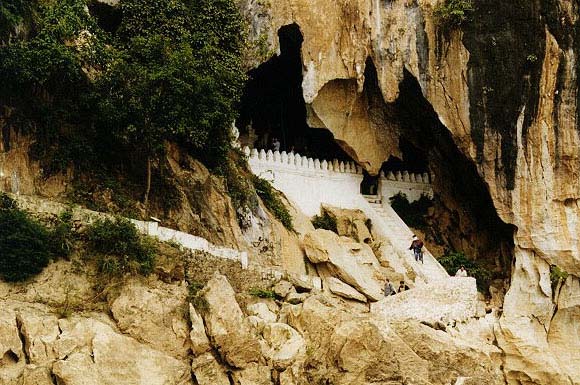 |
| Entrance to the Pak Ou Caves |
Even from the water, the Pak Ou Caves are spectacular. A jagged hole in the cliff face reveals a cave filled with hundreds of statues of the Buddha. The boatman and his wife guided their longboat up to a dock of tied bamboo stalks. Andy and I climbed out onto the dock, then up the carved stone steps to the cave entrance.
For at least the last 500 years, kings and pilgrims have worshipped at Pak Ou's lower cave, Tham Ting. The cave is packed to the teeth with Buddhist icons. Some statues of the Buddha stand straight up with their palms out. This style means "stop arguing." The seated statues with one hand pointed down mean "to bear witness." Hundreds of statues line the stairways, rest on nooks in the cave walls, and teeter on stone shelves. This is the kind of mystical place that graces tour book covers: quiet and sacred, tucked away in the belly of a cliff.
From there, we hiked up a long and awkward brick staircase that was flanked on both sides with trees. Finally we came to Tham Phum - the upper caves. A fat, almost pregnant-looking Buddha guarded the entrance to these dark caves. It is fascinating to see all the different styles of Buddhist statues - heavy, thin, standing, lying down. Inside Tham Phum, dozens more statues lined the rough cave walls. These caves are lit only by a few rows of candles and the dim beams of tourists' flashlights. When Andy shone his flashlight on one statue, he threw a huge shadow onto the cave wall. By the meager light, I could see a network of cobwebs spanning across the ceiling.
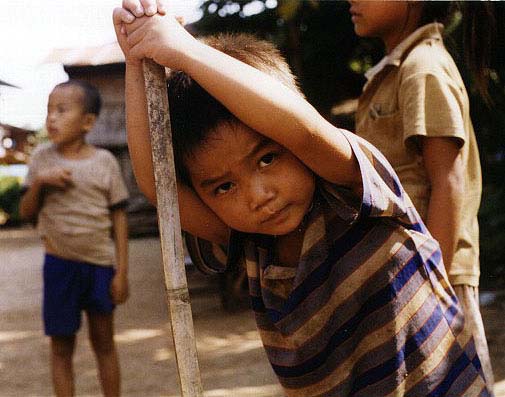 |
| Lao boy playing with a stick, Ban Xiang Hai |
We met the boatman down on the riverbank then journeyed back down river. He backtracked a bit and steered us past Phaa Hen, an impressive limestone cliff that reminded me of the "Cliffs of Insanity" in The Princess Bride. A few minutes later we docked along the sands of a local village, Ban Xiang Hai, or the Jar Maker Village. A larger longboat unloaded about twenty French tourists just as we got there, and we soon realized that this "authentic Lao village" was a tourist trap. The children charged for photos. The main dirt road was lined with wooden shops. Women offered shots of lao lao (AKA rice whiskey) that burned like firewater and Lao Khao Kam, a syrupy red rice wine.
The tourist trade aside, it was a pretty little village. Along the beach, boys ran out of the water and pulled T-shirts over their wet skin. A little girl swept her bangs out of her eyes as she chewed on the corner of a beach towel. A boy tossed around a bike tire. Up on the village road, colorful thread was drawn all the way across wall-sized looms. Woven cloth sat in stacks along the street. Andy tried a gulp of the rice whiskey. As he tipped his head back and swallowed it, I could see his eyebrows fly up and his face turn pink. He also bought a Pu No doll, which is a little red-faced demon with matted ropes of hair. According to legend, Pu No and his twin Na No are benevolent spirit demons. As Khun Boron, the father of the first Lao king, explored northern Laos in search of the right place to build a capital city, Pu No and Na No cleared for him a path through the dense jungle, leveling everything in their wake, until they came upon Mount Phousi. They stopped at the base of the hill and decided that this was the spot to found the city of Luang Prabang. Khun Boron then declared his son, Khun Lo, as the king of this new city.
Lao Children, Ban Xiang Hai
Want to see more kids from the Jar Makers Village?
Visit The Children of Southeast Asia
Several more miles up river, the boatman pulled over at the speedboat dock. Earlier that day we asked him how we should go about booking a speedboat to take us up the Mekong to the Thai border. He shouted uphill to the speedboat pilots, then told us they could take us to Huay Xia the next morning for 30,000 kip (just over $17). It it was a good price, so we agreed. The boatman's wife pushed her oar off the dock, and we slipped back into the current. I leaned over the rim and felt the wind rush by. Every once in a while, I could see monks walking along the beach. Their saffron robes stood out against the dense jungle backdrop. Finally, the long boat driver dropped us off at the shores of Luang Prabang.
Straight uphill from the dock is Wat Xieng Thong, where we'd met the novice who had invited us to the concert a few nights back. We still felt pretty bad about not showing up, so we figured this was a good time to find him and apologize. I was worried that he would be hard to find. All the novices were around the same age and wore the same robes. He had probably shaven his head since we last saw him, and more importantly, we couldn't remember his name. Luckily he recognized us as soon as we walked onto the grounds. He was sitting on the steps of the monk's quarters, and as soon as he waved, we recognized him immediately.
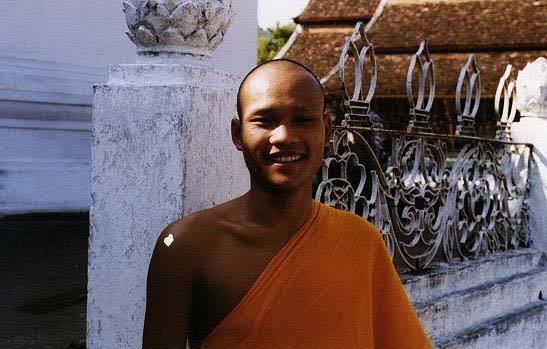 |
| Our new friend Boua Geun |
We sat down on the steps with him, but before we could apologize, he explained that he didn't make it to the concert because he was sick. He had seen us on the street the night before and tried to apologize, but we didn't seem to recognize him. So he was the monk in the red floppy hat who said sorry. Andy and I then tripped over each other's words to explain that we hadn't made it to the concert either because Andy stepped in a mud hole. We told him that we had come to Wat Xieng Thong to apologize to him, and no, we hadn't recognized him in the hat. I think we all felt better after that. After all our worrying, nobody was waiting at the concert. What a relief.
After getting that one straightened out, the three of us leaned back and talked for a while. He was confident and soft-spoken. His orange robe draped over one shoulder as he rested his elbow on the stairs. We asked him to write his name and address in the back of Andy's journal. He wrote "Tikeo Boua Geun." In Laos, people write their family names first, so his "last name" was Tikeo, and his "first name" was Boua Geun. He asked for our addresses as well, so I wrote out Andy's home address on the back of his business card. I started to hand it to Boua, but I suddenly remembered that a monk can't take anything from a woman's hand. I jerked my arm back and handed the card to Andy who passed it on to Boua. Before I tore it away, Boua was about to take the card from my hand. Maybe they weren't as strict about those rules in Lao Buddhism. As he took the card from Andy, I noticed that like so many other Lao men, he had one long thumbnail. I asked him why that is, and he explained it was for playing guitar. Andy pointed out that in Cambodia a lot of men have one long pinky nail for good luck.
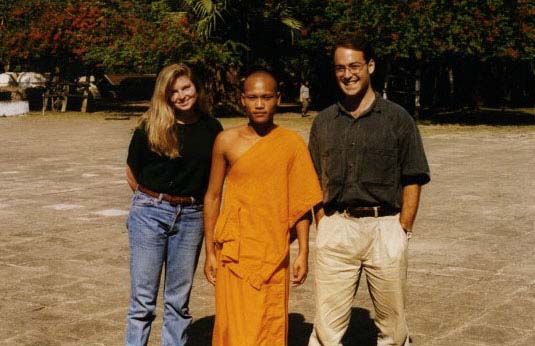 |
| Our new friend Boua Geun |
Boua asked about our homes in the US. We told him a little bit about Florida (where Andy is from), Chicago (where I am from) and Washington, D.C. (where we both live now). He told us that he was from up north in Sanyabuli province, near the Chinese border. He had an older, unmarried sister and a younger brother. His brother still hadn't decided whether or not he wanted to be a novice like Boua, but either way it was up to him.
We started to compare all the languages we knew and then taught each other all the different ways we could think of to say "I love you." "Je t'aime" in French... "Ya vas lyublyu" in Russian. Then we moved on to cheers and hellos, nasdrovia and l'chaim, salaam and shalom. After about 30 minutes, Andy and I started to get hungry. We posed for a couple pictures with Boua then said goodbye. He told us that he was hoping to study in France someday and maybe even go to the USA.
As we walked out the gate and headed toward the heart of the city, I felt an acute sense of guilt. Being an American, I figured the people of Laos had to bear us some ill-will. During the Vietnam War, this quiet country was "bombed into the stone age" by US planes. Over two million tons of ammo where dropped on these little villages and rolling rice paddies. That makes Laos the most heavily bombed country in the history of war. Amazingly, it seemed to me that they had forgiven us completely. To the shop keeper and her grandchildren, we were welcomed guests. To Boua, we were travelers with stories to share. We were people, not nations. And just like them, we were worthy of respect. I never met anyone in Laos who wasn't kind and hospitable.
Since it was our last night in Laos, we decided to go back to the Villa Santi. We sat on the second floor balcony again so we could look out over the palm trees. We ordered the egg rolls again, the mushroom and onion soup, and minced chicken with basil. Andy reached for the pepper and knocked the entire salt and pepper stock off the second floor balcony into the garden. The nicest restaurant in the country, and we knock the condiments off the balcony! Luckily after the pepper incident, we spotted a New Yoker who we'd met a couple days ago at the bakery. Since he was alone, we invited him to come and sit with us. He pulled up a chair and had his dinner brought to our table. I'm glad he joined us. He was a trip.
The New Yorker had that all-American look going. He was likeable, clean cut, boyish and laid back. He was a technical writer on vacation for the last month. He told us that he just came from Chiang Mai in northern Thailand; before that, he had meditated at a Buddhist monestary in Nepal. Then he told us that he was about to get married to a woman he proposed to after just six weeks of dating. Apparently on their first date she mentioned marriage over the appetizers. His first wife died several years ago, and he was ready to settle down again. Besides, he went on, he and his fiance were both in their 40's. By his looks and demeanor, I could have sworn he wasn't more than 33 years old. He planned this trip before he met her, so they set the wedding date for a couple weeks after he returned to the US.
Since we were heading towards Chiang Mai in the morning, we asked him what he thought of the city. He sipped his glass of Beer Lao and launched into a catalog of the city's merchandise. He told us you could have a silk suit cut overnight, cheap chrome Elvis sunglasses made to fit your perscription, and a naked shoeshine from a prostitute. "That proves just how dumb men are, that they would get a naked shoeshine," he laughed. You could get the wax cleaned out of your ears... "a whole jar-full," he said. "It's like scratching an itch you didn't know you had." You can see Thai boxing and go-go dancers under the same roof. You can get vailum or pot or dozens of prescription drugs for pennies, "although the pot isn't very good here," he shook his head. He told us about his ex-pat friends who lived there and hired prositutes. He thought that was the dumbest thing because "The women hate you." "There's one prostitute in Chiang Mai," he continued, "She's the most popular one in the whole city, and it's because she pretends she likes you. And she looks like Wynona Ryder, but the important thing is she pretends to like you." His fiancee was set to arrive in Bangkok in a week or so. He planned to bring her to the nicest hotel in town, The Oriental, show her a couple important sites and then "get the hell out of Dodge." Maybe he wasn't as all-American as he looked, but he was a character.
As the New Yorker told his stories, I watched the moon from behind a large palm tree. As time went by, the big round moon rose higher and higher past the palm leaves - as smooth as the second hand on a watch. After we all finished our meal, we wished him luck and said good-bye.
On the way back to the hotel, we ran into the shopkeeper's children again. They immediately remembered Andy. Curled up in a chair, the little girl was too tired to get up, but the little boy grabbed Andy's legs and hugged him. Andy held out his palm and said, "Gimmee five!" The little boy slapped his palm. Andy put out both hands, and the boy pressed his chubby little palms against them. We said our final good-byes and started back towards the hotel. The little girl wiped the sleep from her eyes and waved.




